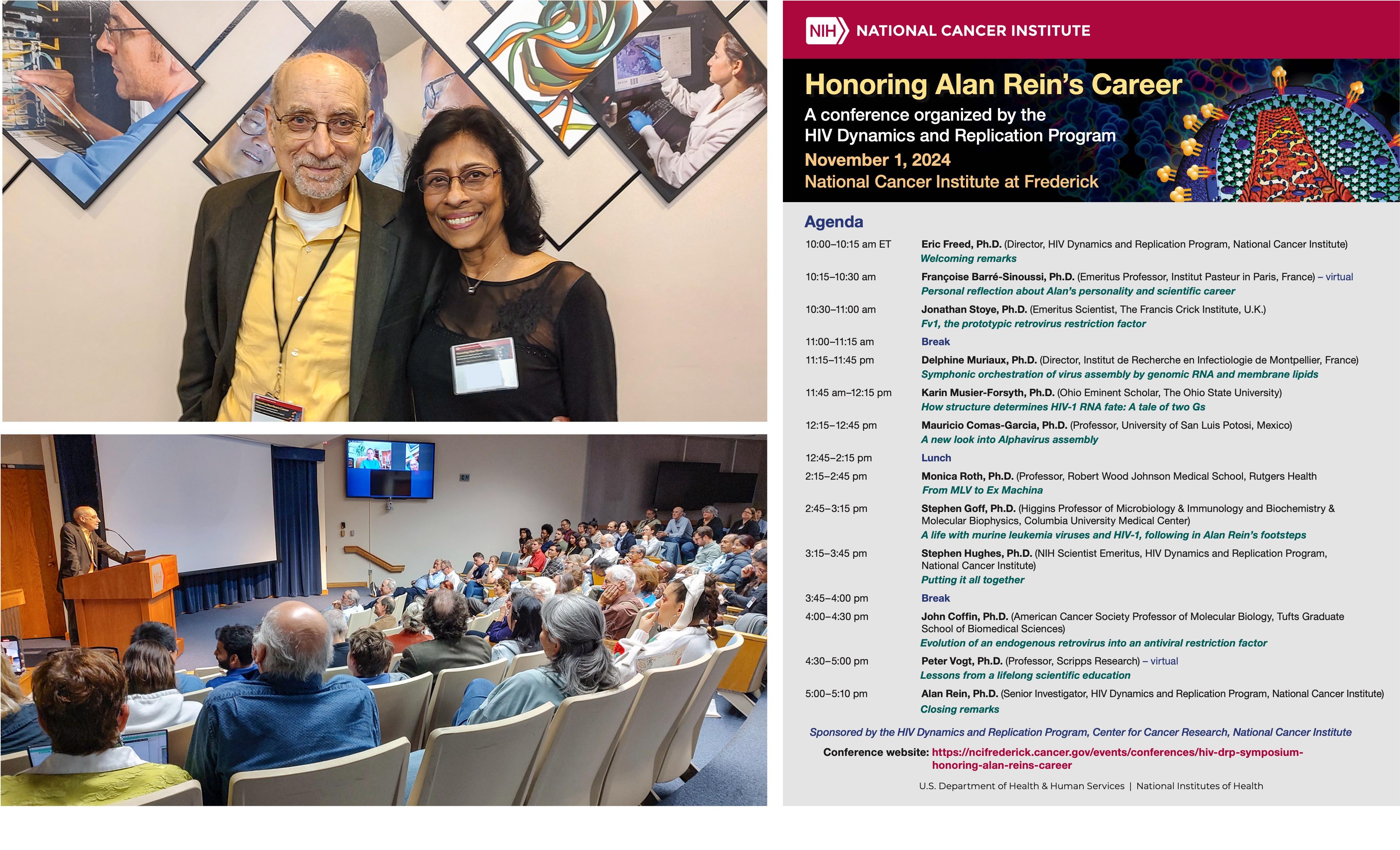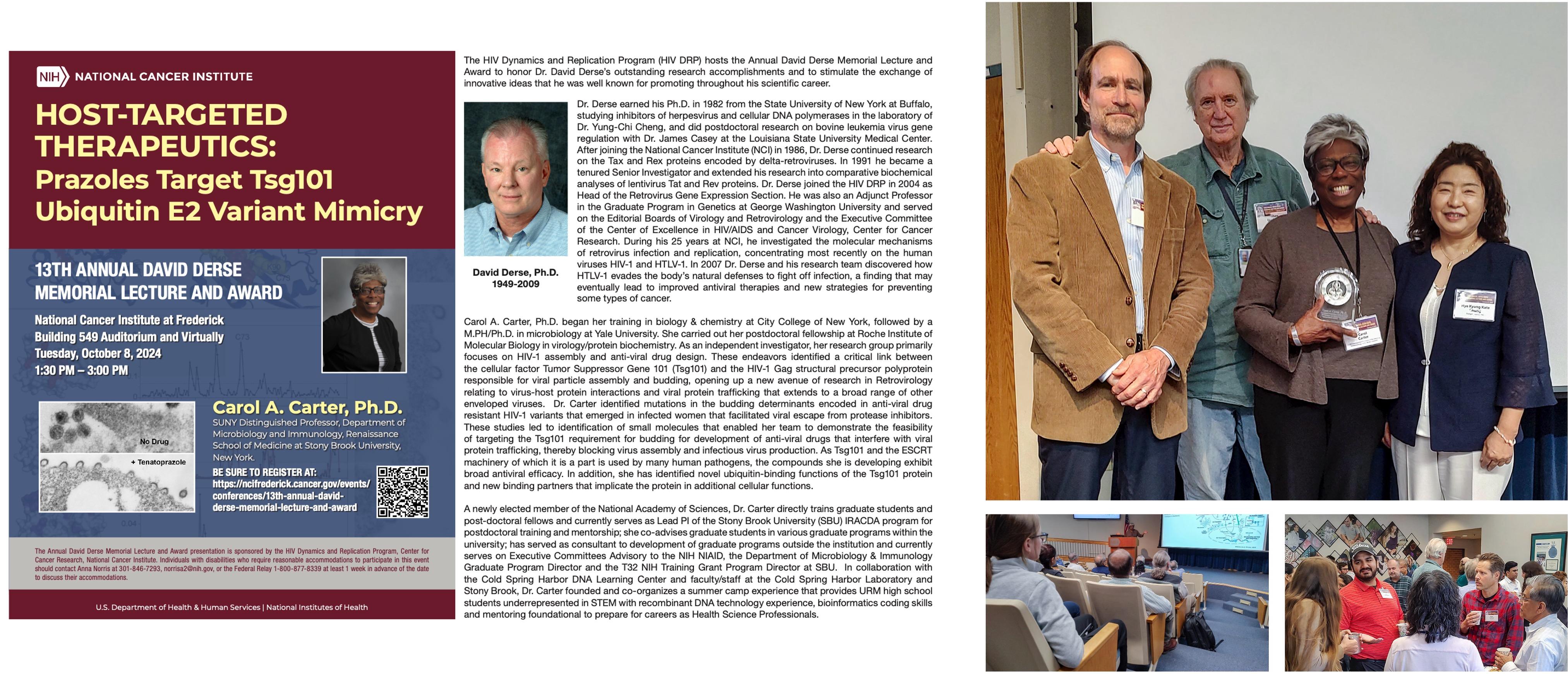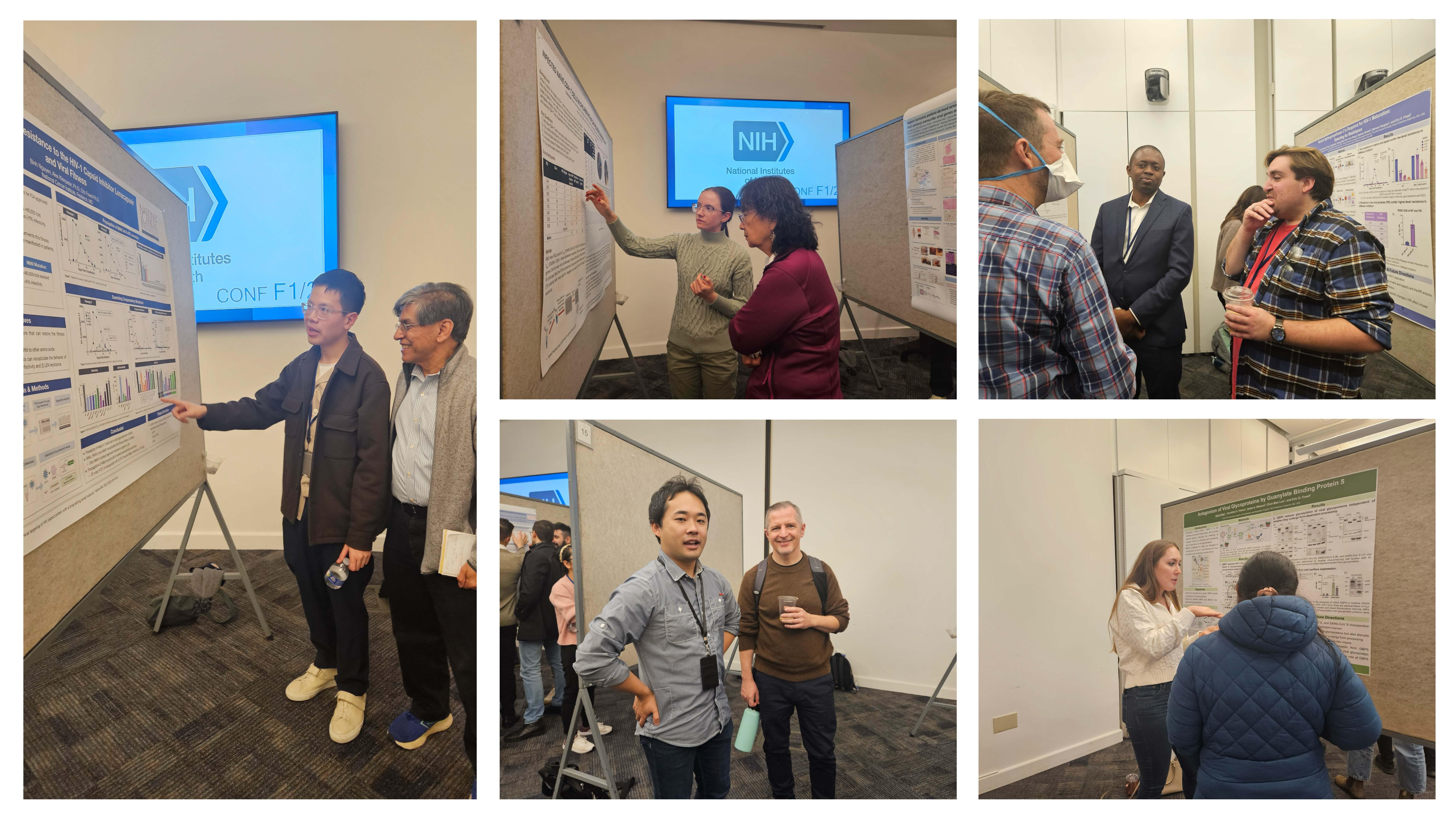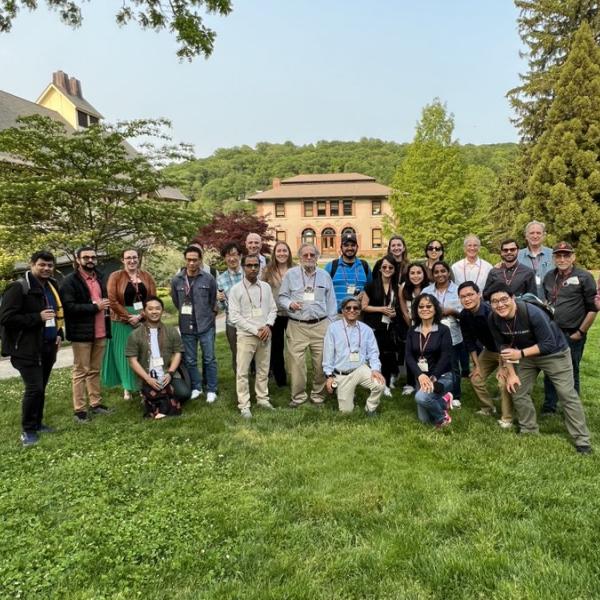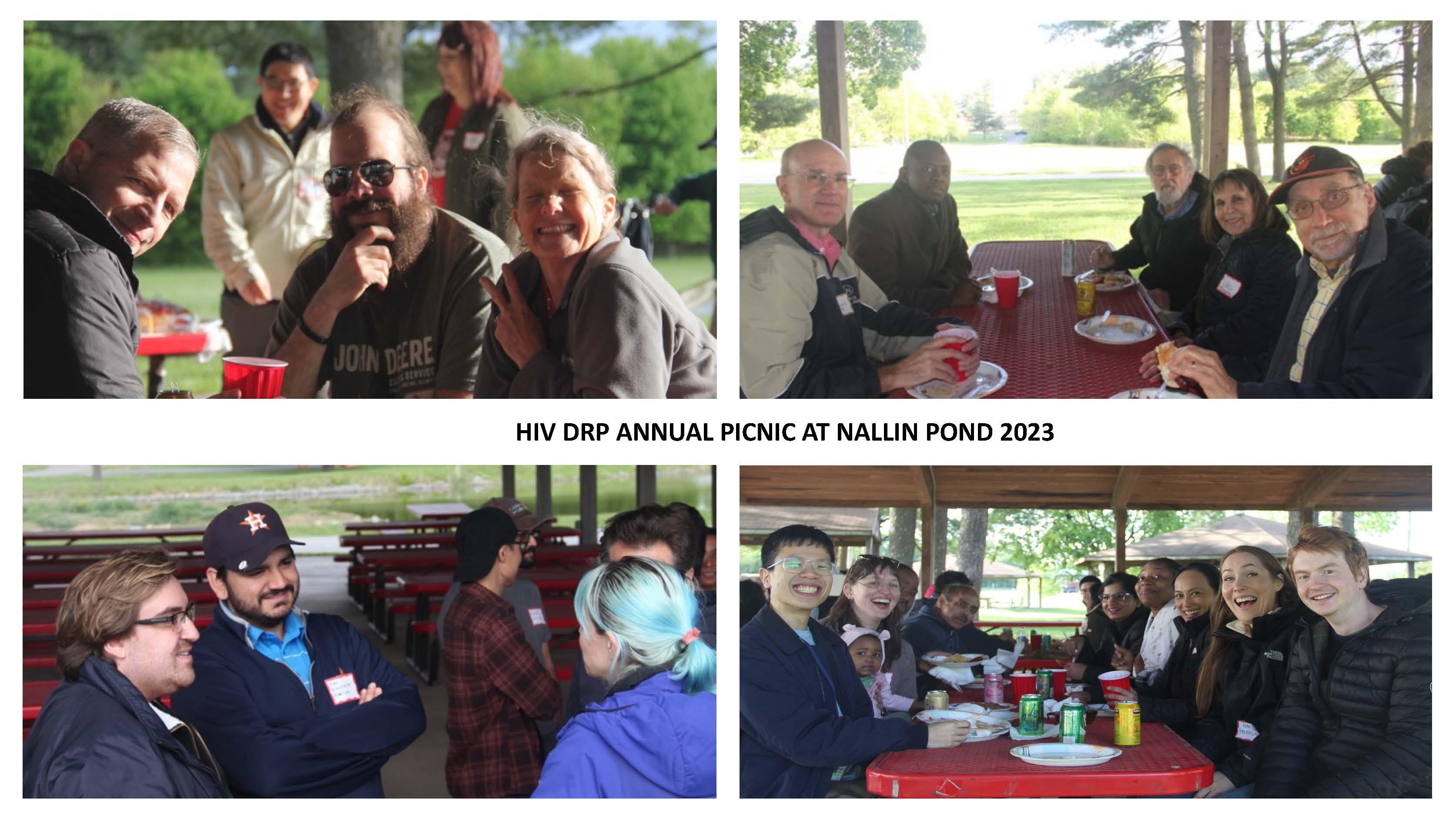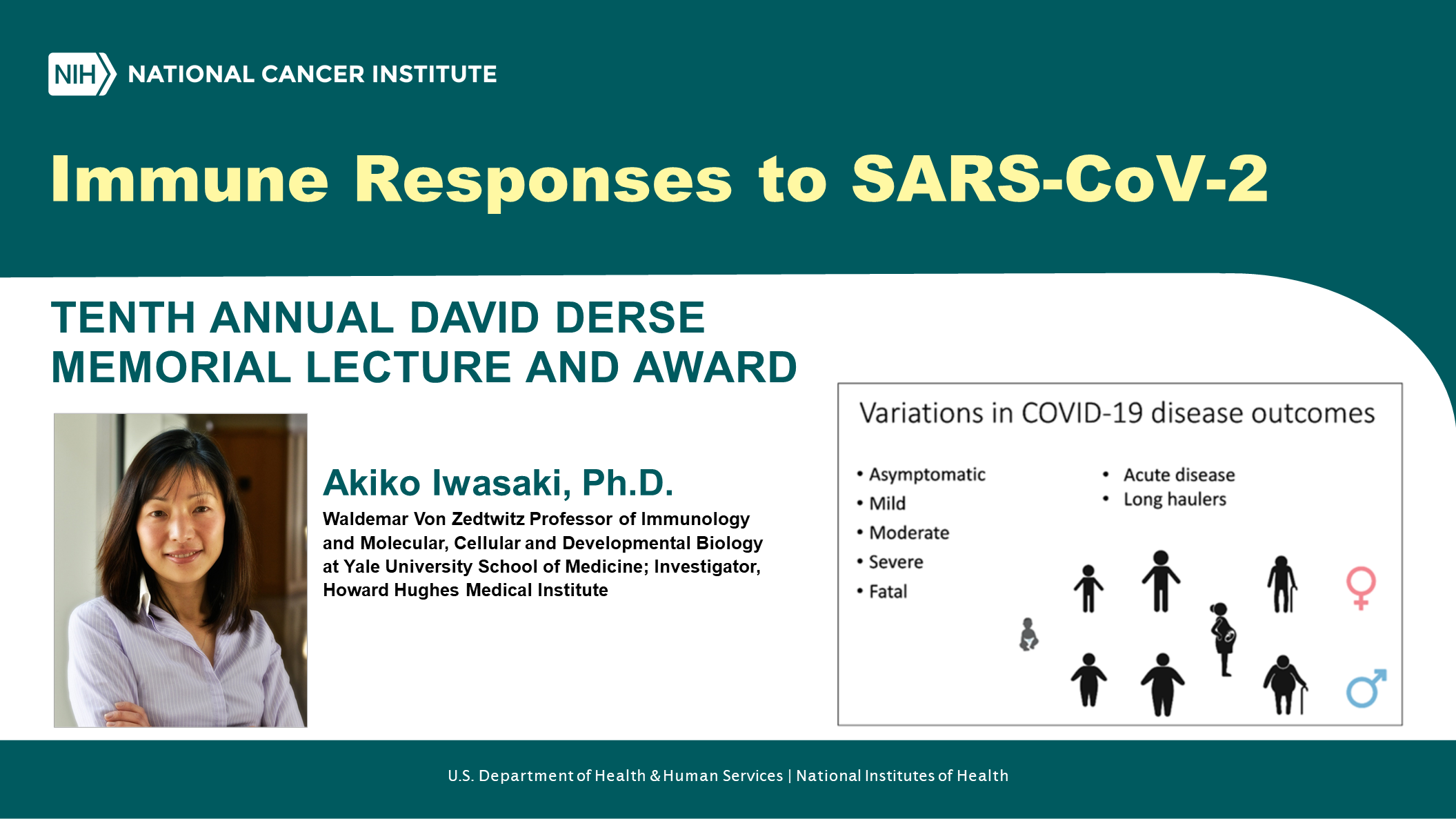News highlights from past years are listed below.
2024 NCI Director's Award
The DRP Advisory Committee received the 2024 NCI Director's Award for Workplace Wellness-NCI Champions for their accomplishments, "For launching fellow-led initiatives to enhance the personal and professional development of all HIV Dynamics and Replication Program fellows, students and staff".
HIV DRP Conference Honoring Alan Rein's Career - November 1. 2024
After many years at the National Cancer Institute, Dr. Alan Rein, one of the founding members of the HIV Dynamics and Replication Program (HIV DRP), retired on January 1. 2025. The HIV DRP organized a one-day symposium on November 1, 2024, to celebrate Alan’s distinguished career.
The scientific component of the symposium included talks by invited speakers: Françoise Barré-Sinoussi, John Coffin, Mauricio Comas-Garcia, Steve Goff, Steve Hughes, Delphine Muriaux, Karin Musier-Forsyth, Monica Roth, Jonathan Stoye, and Peter Vogt.
This event is available to watch via NIH VideoCast here.
Congratulations to Val Turnquist on her retirement
After 42 years as an AO/Administrative Lab Manager at NCI-Frederick/HIV DRP, Val retired March 30, 2024. We wish you all the very best in the next chapter of life. Thank You Val!
HIV DRP 27th Think Tank 2024
The HIV Dynamics and Replication Program (HIV DRP) held it's 27th Annual DRP Think Tank Meeting on Tuesday, April 30, 2024. As before, the program consisted of a series of short (15-minutes or less) presentations by members of the local retrovirology community on topics related to HIV, AIDS, and retrovirus biology.
We had a fantastic turnout with an average of 70 in-person and 100 online.
Congratulations to the winners of the NCI travel fellows award*:
- Alex Kleinpeter (HIV-DRP, Eric Freed lab) for his talk on “Recent advances in our understanding of the role of IP6 in HIV-1 replication”
- Kate Skorupkta (CIL) for her talk on “Structural basis of Vif-induced ubiquitination of APOBEC3H”
*only NCI fellows were eligible for this award.
The event was recorded. Below you will find a zoom link and passcode. Please note this only includes those who agreed to having their talk recorded.
Passcode: 02Pl%wy8
Think Tank 2024 - Celebrating John Coffin's birthday
Congratulations to Sue Toms on her retirement
After nearly 25 years at the HIV DRP as a program specialist (and 51 years at NCI-Frederick), Sue retired June 28, 2024. We wish you all the very best in the next chapter of life. Thank You Sue!
HIV DRP at CSHL Retrovirology Meeting 2024
Members of the HIV DRP and alumni attended the 2024 Cold Spring Harbor Laboratory Retrovirology Meeting.
Eric Freed delivered this year’s keynote address, “Uncovering the mysteries of HIV replication (or trying to)’ To view, click here: https://leadingstrand.cshl.edu/Keynote/Media/2024/RETRO/691
Oral presentations were delivered by Annemarie Glassey (Maldarelli lab), Yuta Hikichi (Freed lab), Saiful Islam (Hu lab), CY Lau (Maldarelli lab), and Alan Rein. Ryan C. Burdick (Pathak lab) delivered his talk as the recipient of the 2024 Uta von Schwedler Award and Alex Kleinpeter (Freed lab) as the recipient of the 2024 Andy Kaplan Award.
Poster presentations were made by Sherimay Ablan (Freed lab), Ellie Bare (Pathak lab), Zatao Cheng (Hu lab), Alice Duchon (Hu lab), Lindsay Farr (Freed lab), Sarah Harrison (Hu lab), Jonathan Kitzrow (Hu lab), Chenglei Li (Pathak lab), Hana Veler (Freed lab), and Geraldine Vilmen (Freed lab).
Annual HIV DRP Research Review Picnic 2024
The annual HIV DRP research review & picnic took place in July. Each PI presented a research update for their lab, followed by a picnic/BBQ held at Nallin pond.
13th Annual David Derse Memorial Lecture and Award: Carol Carter - October 8. 2024
The HIV Dynamics and Replication Program (HIV DRP) with support from Hye Kyung Chung-Derse and NCI hosted the 13th David Derse Memorial Lecture and Award to honor Dr. David Derse’s outstanding research accomplishments and to stimulate the exchange of innovative ideas that he was well known for promoting throughout his scientific career.
Carol Carter, Ph.D. (SUNY Distinguished Professor of Microbiology & Immunology, Stony Brook University) delivered the 13th lecture on October 8. 2024 titled "HOST-TARGETED THERAPEUTICS: Prazoles Target Tsg101 Ubiquitin E2 Variant Mimicry".
The lecture is available on NIH VideoCast here.
NCI-Poster article on the event is available here.
Travel Awards, Fall HIV/AIDS & Cancer Virology Think Tank Meeting 2023
The NCI’s 2023 Annual CEHCV Fall Think Tank was held on December 8th 2023 at Bethesda campus. This one-day event is designed to facilitate the exchange of information about advances in the discovery, development, and delivery of antiviral and immunologic approaches for the prevention and treatment of HIV infection, AIDS-related malignancies, and cancer-associated viruses and encourage collaboration. Opening remarks were held by Vinay Pathak (DRP) and Cynthia Masision (OSP). John Schiller (NIH) kicked off this year’s event with his talk “The Surprises in Developing HPV Virus-Like Particles as an HPV Prophylactic Vaccine and a Broad-Spectrum Cancer Therapy”. Followed by the afternoon session guest speaker Genoveffa Franchini on “Innate and Adaptive Immunity to Prevent SIV/HIV infection”.
Invited speakers from the DRP included, Lulu Yu (Zheng lab), Joshua Gluck (Kearney lab), Yuta Hikichi (Freed lab), Ryan Burdick (Pathak lab), Jonathan Kitzrow (Hu lab), and Annemarie Glassy (Maldarelli lab). Session chairs included the DRP’s staff scientist’s Alice Duchon (Hu lab) and Abdul Waheed (Freed lab).
Travel awards were presented to Yukta Hikichi (Freed lab) and Ryan Burdick (Pathak lab) for outstanding oral presentations. In addition, both Linsey Farr (Freed lab) and Binh Nguyen (Freed lab) won travel awards for outstanding poster presentations.
To view this event a videocast is available here.
Above: members of the DRP presenting their posters.
12th Annual David Derse Memorial Lecture and Award: Louis Mansky
The HIV Dynamics and Replication Program (HIV DRP) with support from Hye Kyung Chung-Derse and NCI hosted the Annual David Derse Memorial Lecture and Award to honor Dr. David Derse’s outstanding research accomplishments and to stimulate the exchange of innovative ideas that he was well known for promoting throughout his scientific career.
Louis Mansky, Ph.D (Professor of Molecular Virology, University of Minnesota) delivered the twelfth lecture on November 2nd 2023 titled "Novel Insights Into Human Retrovirus Replication Through Comparative Analysis".
A videocast is available here.
A NCI-poster article is available here.
2023 HIV DRP Conference Turning foe into friend: harnessing viruses for research and medicine
Harnessing Viruses for Research and Medicine was held on October 24th. The HIV Dynamics and Replication Program (HIV DRP) organized this hybrid conference to showcase the latest research on the use of viruses and viral vectors as tools for research and medicine and as agents that are domesticated by mammalian systems to serve beneficial functions for the host. Invited speakers in this outstanding program included Jennifer Brudno (National Cancer Institute), John Coffin (Tufts University), Michael Farzan (Harvard University), Klaus Früh (Oregon Health and Sciences University), Matthias Gromeier (Duke University), David Largaespada (University of Minnesota), Robert “Chip” Schooley (University of California, San Diego;), Nancy Sullivan (Boston University), and Sarah Wootton (Ontario Veterinary College).
A videocast is available here.
A NCI-poster article is available here.
Members of the HIV DRP and Alumni attending Cold Spring Harbor Laboratory Retrovirology Meeting 2023
Annual HIV DRP Research Review Picnic 2023
Following the HIV DRP Research Review, where each PI presents a research update for their lab, the picnic/BBQ was held at Nallin pond.
11th Annual David Derse Memorial Lecture and Award: Daria Hazuda
The 11th Annual David Derse Memorial Lecture and Award presentation will be held virtually on March 14, 2023. This annual event honors the outstanding research accomplishments of David Derse, Ph.D., Principal Investigator and Head of the Retrovirus Gene Expression Section in the HIV DRP.
The HIV DRP sponsors the Annual David Derse Memorial Lecture and Award, with support from Hye Kyung Chung-Derse and the National Cancer Institute, to foster the scientific discourse and exchange of innovative ideas that Dr. Derse was well known for promoting throughout his scientific career.
Daria Hazuda, Ph.D. (Head of Infectious Disease and Vaccines at Generate Biomedicines and Former Vice President of Infectious Disease and Vaccines at Merck Research Labs). The title of her presentation is “HIV Drug Discovery: Past, Present and lessons for the future".
Additional details, including the agenda and information about joining the virtual event by Webex, are available at https://ncifrederick.cancer.gov/events/conferences/eleventh-annual-david-derse-memorial-lecture-and-award.
HIV DRP Symposium Honors Stephen Hughes' Career
In recognition of his recent retirement, HIV DRP hosted a symposium on October, 19, 2022, to celebrate Dr. Stephen Hughes’ illustrious career. The scientific component of the symposium included talks by the following invited speakers: Eddy Arnold, Mike Bishop, Mario Capecchi, John Coffin, Wei-Shau Hu, Mary Kearney, Jeff Lifson, Dmitry Lyumkis, Bob Siliciano, Ron Swanstrom, Harold Varmus, and Peter Vogt. Jeff Strathern, Nita Maihle, and Larry Arthur also said a few words about Steve’s scientific and non-scientific accomplishments. View NIH Videocast.
10th Annual David Derse Memorial Lecture and Award: Akiko Iwasaki
The 10th Annual David Derse Memorial Lecture and Award presentation will be held virtually on November 16, 2021. This annual event honors the outstanding research accomplishments of David Derse, Ph.D., Principal Investigator and Head of the Retrovirus Gene Expression Section in the HIV DRP. During his 25 years at the National Cancer Institute, Dr. Derse investigated the molecular mechanisms of retrovirus infection and replication, concentrating most recently on the human viruses HIV-1 and HTLV-1. In 2007, he and his research team discovered how HTLV-1 evades the body's natural defenses to fight off infection, a finding that may eventually lead to improved antiviral therapies and new strategies for preventing some types of cancer.
The HIV DRP sponsors the Annual David Derse Memorial Lecture and Award, with support from Hye Kyung Chung-Derse and the National Cancer Institute, to foster the scientific discourse and exchange of innovative ideas that Dr. Derse was well known for promoting throughout his scientific career.
Akiko Iwasaki, Ph.D. (Waldemar Von Zedtwitz Professor of Immunology and Molecular, Cellular and Developmental Biology at Yale University School of Medicine and Howard Hughes Medical Institute Investigator) will deliver the tenth lecture in this series. The title of her presentation is “Immune Responses to SARS-CoV-2.”
Additional details, including the agenda and information about joining the virtual event by Webex, are available at https://ncifrederick.cancer.gov/events/conferences/tenth-annual-david-derse-memorial-lecture-and-award-2021. After the event, an archived videocast will be available for viewing at videocast.nih.gov/watch=43976.
2021 HIV DRP Conference on Virus Entry and Post-Entry Events
Virus Entry and Post-Entry Events was held on October 13, 2021. The HIV DRP organized this virtual conference to showcase the latest research on the cell, molecular, and structural biology of virus entry and post-entry, focusing on new approaches to understanding the mechanisms of viral pathogenesis with the goal of developing improved therapeutics against existing and emerging infectious diseases, including COVID-19. Invited speakers in this outstanding program included Sarah Butcher, Daniel DiMaio, Ekaterina Heldwein, Wendy Maury, Walther Mothes, Vinay Pathak, Stefan Pöhlmann, Félix Rey, and Erica Ollmann Saphire. After the conference, an archived videocast will be available for viewing at https://videocast.nih.gov/watch=43962. Additional details, including the conference agenda, are available at https://ncifrederick.cancer.gov/events/conferences/virus-entry-and-post-entry-events.
In previous years, the HIV DRP Conference showcased other topics on the discovery, development, and delivery of antiviral and immunologic approaches for the prevention and treatment of viral infection, including Virus-Cell Interactions: New Approaches and Technologies; Therapeutic Interventions and Resistance Mechanisms; Establishment and Control of Viral Persistence; Innate Immunity: Sensing, Signaling, and Selection; Emerging Viruses: Origins, Biology, and Control of Transmission; Approaches to a Functional Cure for HIV Infection; Virus Structure: Putting the Pieces Together; Host Factors and Cofactors in HIV Infection; and Trafficking of Viral Macromolecules.
9th Annual David Derse Memorial Lecture and Award: Stephen P. Goff
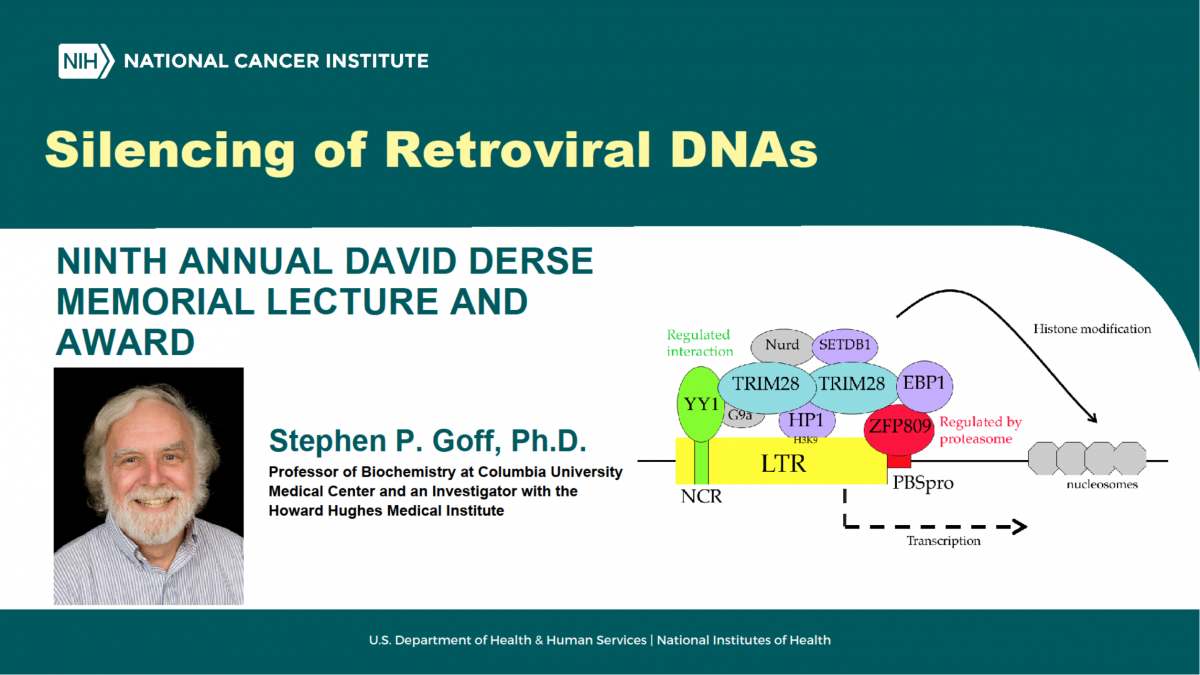
The 9th Annual David Derse Memorial Lecture and Award presentation was held virtually on November 10, 2020. This annual event honors the outstanding research accomplishments of David Derse, Ph.D., Principal Investigator and Head of the Retrovirus Gene Expression Section in the HIV DRP. During his 25 years at the National Cancer Institute, Dr. Derse investigated the molecular mechanisms of retrovirus infection and replication, concentrating most recently on the human viruses HIV-1 and HTLV-1. In 2007, he and his research team discovered how HTLV-1 evades the body's natural defenses to fight off infection, a finding that may eventually lead to improved antiviral therapies and new strategies for preventing some types of cancer.
The HIV DRP sponsors the Annual David Derse Memorial Lecture and Award, with support from Hye Kyung Chung-Derse and the National Cancer Institute, to foster the scientific discourse and exchange of innovative ideas that Dr. Derse was well known for promoting throughout his scientific career.
Stephen P. Goff, Ph.D. (Higgins Professor of Biochemistry and Molecular Biophysics at Columbia University Medical Center and Howard Hughes Medical Institute Investigator) delivered the ninth lecture in this series. The title of his presentation was “Silencing of Retroviral DNAs.”
The archived videocast of this event is available on the NIH Videocast website at videocast.nih.gov/watch=40067.
2020 HIV DRP Conference on Virus-Cell Interactions: New Approaches and Technologies
Virus-Cell Interactions: New Approaches and Technologies was held on October 21, 2020. The HIV DRP organized this virtual conference to showcase the latest research on virus–cell interactions, focusing on new approaches to understanding the mechanisms of viral pathogenesis and host antiviral defenses, with the goal of developing improved therapeutics against existing and emerging infectious diseases.
Invited speakers in the outstanding program included Stephen Elledge (Harvard Medical School and Howard Hughes Medical Institute), Timothy Henrich (University of California San Francisco), Christopher Hill (University of Utah School of Medicine), Judd Hultquist (Northwestern University), Taina Immonen (National Cancer Institute-Frederick), Daniel Kaufmann (University of Montreal), James Munro (University of Massachusetts Medical School), Tatyana Polenova (University of Delaware), and Elizabeth Wright (University of Wisconsin-Madison).
In previous years, the HIV DRP Conference showcased other topics on the discovery, development, and delivery of antiviral and immunologic approaches for the prevention and treatment of viral infection, including Therapeutic Interventions and Resistance Mechanisms; Establishment and Control of Viral Persistence; Innate Immunity: Sensing, Signaling, and Selection; Emerging Viruses: Origins, Biology, and Control of Transmission; Approaches to a Functional Cure for HIV Infection; Virus Structure: Putting the Pieces Together; Host Factors and Cofactors in HIV Infection; and Trafficking of Viral Macromolecules.
Stephen Hughes: Inside the War Room Against Drug-Resistant HIV
[The following excerpt is from the article "Inside the War Room Against Drug-Resistant HIV," published by Samuel Lopez in the NCI at Frederick Poster, 8 September 2020.]
Steve Hughes, Ph.D., compares HIV research to a war. He and his colleagues are entrenched on a microscopic battlefield, fighting a conflict where seemingly small victories could mean a leap forward.
Right now, they are grappling with the emergence of HIV strains resistant to existing antiretroviral drugs, medicines that suppress the virus in people living with HIV. The team’s current target is integrase, an enzyme that HIV uses to insert a DNA copy of its genetic information into the DNA of a host cell, thereby allowing the virus to replicate and spread.
HIV research and treatment have come far in the four decades since the virus was discovered. Today, most infections can be managed by therapies that use a combination of state-of-the-art antiretroviral drugs. But mutated strains that resist even the best HIV drugs can arise. Developing treatments for them is an ongoing battle in a long war.
“There are some mutants that are a problem, and the ones that are really bad are a problem for everybody,” said Hughes, chief of the Retroviral Replication Laboratory and senior investigator in the HIV Dynamics and Replication Program at NCI at Frederick.
In Memoriam: Stephen Oroszlan, Ph.D., Scientist Emeritus
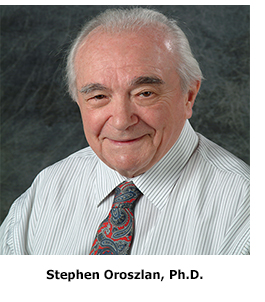
The HIV DRP mourns the recent death of Stephen Oroszlan, a pioneer in studies related to the biochemistry and enzymology of retroviral replication and the biosynthesis of retroviral enzymes and structural proteins.
Dr. Oroszlan received his early training in chemical engineering in his native Hungary. Following his immigration to the U.S., he obtained a Ph.D. in Pharmacology from Georgetown University. After his postdoctoral training at the NCI from 1961 to 1963, he conducted biochemistry research on retroviruses at the Albert Einstein Medical Center, George Washington University School of Medicine, and Flow Laboratories. In 1976 he returned to the NCI and served as Director of the Molecular Virology and Carcinogenesis Laboratory, ABL-Basic Research Program, from 1983 to 1995. He was appointed Scientist Emeritus in 1995, and since 1999 he had been affiliated with the HIV DRP.
Dr. Oroszlan was perhaps best known for his groundbreaking research defining the role of retroviral proteases in the generation of mature Gag-related protein products, which comprise the virus particle structure. This work played a central role in the development of HIV protease inhibitors, which became a mainstay in the treatment of HIV-infected individuals. His laboratory also discovered that many retroviral Gag proteins are modified with the fatty acid myristate, a finding that was of great importance in understanding the assembly of retroviral particles. He published more than 250 papers and was named one of the most highly cited researchers in microbiology by the Institute for Scientific Information.
Dr. Oroszlan's numerous honors include the award of a Doctor Honoris Causa Degree from the University of Debrecen Medical School in 1993, election to the Hungarian Academy of Sciences as a foreign associate in 1994, a Retroviral Retrospective Symposium held in his honor at Hood College in 1994, and the Mór Kaposi Research Foundation Award in 2000.
Alan Rein, a longtime colleague of Dr. Oroszlan’s and head of the Retrovirus Assembly Section in the HIV DRP, is serving as a guest editor for the Viruses Special Issue “In Memory of Stephen Oroszlan” to honor his work and scientific legacy.
